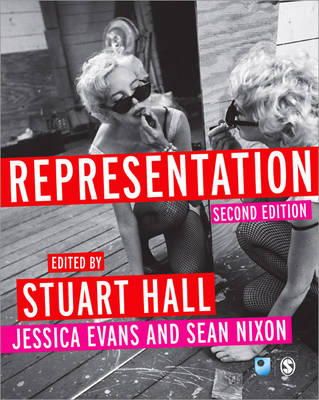
Stock image for illustration purposes only - book cover, edition or condition may vary.
Representation: Cultural Representations and Signifying Practices
Stuart Hall
€ 63.70
FREE Delivery in Ireland
Description for Representation: Cultural Representations and Signifying Practices
Paperback. Highly anticipated Second Edition of one of the most popular and influential books ever written in media and cultural studies. A genuine classic, expertly updated for a new generation of students and researchers. Editor(s): Nixon, Sean; Hall, Stuart; Evans, Jessica. Series: Culture, Media and Identities Series. Num Pages: 440 pages, black & white illustrations, black & white line drawings, black & white tables, figures. BIC Classification: GTE; JFC; JHM. Category: (U) Tertiary Education (US: College). Dimension: 231 x 187 x 23. Weight in Grams: 772.
Since 1997 Representation has been the go-to textbook for students learning the tools to question and critically analyze institutional and media texts and images. This long-awaited second edition:
Since 1997 Representation has been the go-to textbook for students learning the tools to question and critically analyze institutional and media texts and images. This long-awaited second edition:
• updates and refreshes the approaches to representation, signalling key developments in the field
• addresses the emergence of new technologies, media formats, politics and theories
• includes an entirely new chapter on celebrity culture and reality TV
• offers new exercises, readings, images and examples for a new generation of students
This book once again provides an indispensible resource for students and teachers in cultural and media studies.
Product Details
Publisher
SAGE Publications Ltd United Kingdom
Number of pages
440
Format
Paperback
Publication date
2013
Series
Culture, Media and Identities Series
Condition
New
Weight
775g
Number of Pages
440
Place of Publication
London, United Kingdom
ISBN
9781849205634
SKU
V9781849205634
Shipping Time
Usually ships in 4 to 8 working days
Ref
99-6
About Stuart Hall
Stuart Hall was born and raised in Jamaica and arrived in Britain on a Rhodes scholarship to Oxford in 1950. In 1958, he left his PhD on Henry James to found the New Left Review, which did much to open a debate about immigration and the politics of identity. Along with Raymond Williams and Richard Hoggart he established the first Cultural Studies programme at a British university in Birmingham in 1964, bringing the study of popular culture into the understanding of political and social change. After spending more than four decades as one of the UK’s leading public intellectuals, Hall retired from formal academic life in 1997 and since then has continued to devote himself to questions of representation, creativity and difference. He became the chair of two foundations, Iniva, the Institute of International Visual Arts, and Autograph ABP, which seeks to promote photographers from culturally diverse backgrounds, and championed the opening of Iniva’s new Rivington Place arts complex in east London in 2007. Jessica Evans is Senior Lecturer in Cultural & Media Studies at the Open University. Professor Sean Nixon is Head of the Department of Sociology and Director of MA Advertising and Marketing and the Media. at the University of Essex.
Reviews for Representation: Cultural Representations and Signifying Practices
This is simply a magnificent collection of chapters, laced together under the guiding light of Stuart Hall′s outstanding scholarship. The chapters each exemplify the very best modes of cultural studies writing, theoretically informed, lucid, vividly alive and relevant to students and to general readers across the arts, humanities and social sciences. New material by Stuart Hall is particularly welcome, and will be much appreciated given his key role in the development of post-colonial as well as cultural studies. In particular we see Hall lay out the conceptual groundwork for an extensive study of the media from the viewpoint of ′race′ and ethnicity. Angela McRobbie Professor of Communications, Goldsmiths, University of London The second edition of Representation should enable it to speak to new generations of students and to continue to serve as the authoritative introduction to the theories and politics of meaning and representation in cultural studies. Anyone interested in these matters, whether student, teacher or simply curious intellect, will be glad for the time spent reading this book. Lawrence Grossberg University of North Carolina Chapel Hill, Senior Editor of the journal Cultural Studies
